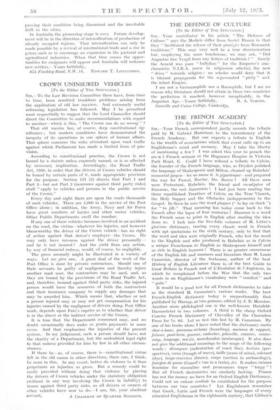CROWN UNINSURED VEHICLES [To the Editor of TIIE SPECTATOR.] Sm,—To
the Law Revision Committee there have, from time to time, been remitted troublous problems arising from the application of old law maxims. And extremely useful reforming legislation has followed. May I be permitted most respectfully to suggest that the Lord Chancellor should direct the Committee to make recommendations with regard to another—which is this, " The Crown can do no wrong " y
That old maxim has, of course, deep constitutional sig-
nificance ; but modern conditions have demonstrated the inequity of its operations in one sphere of human affairs. That sphere concerns the risks attendant upon road traffic against. which Parliament has made a limited form of pro-
vision. . • • , According to constitutional practice, the Crown is not bound by a statute unless expressly named, or is so affected by necessary implication. Accordingly, the Road Traffic Act, 1930, in order that the drivers of Crown vehicles should be bound by certain parts of it, made appropriate provision, for, the purpose.. Section 121 (2) directs that Part 1 and Part 3—but not Part 2 (insurance against third party risks), shall " apply to vehicles and persons in the public service of the Crown."
Every day and night there are upon the roads thousands of such. vehicles. There are .5,000 in the service of the Post, Office alone ; in addition, the Army, Navy and Air Force have great numbers of lorries and other motor vehicles. Other Public Departments swell the number.
If any one of these vehicles becomes involved in an accident on the road, the victim—whatever his injuries, and however blameworthy the driver of the Crown vehicle—has no right of action against that driver's employer—the Crown. He may only have recourse against the driver personally— and he is not insured ! And the yield from any action, by way of financial redress, would, of course, be negligible.
The gross anomaly might be illustrated in a variety of ways. Let me give one. A great deal of the work of the Post Office is done by private, contractors. Should one of their servants be guilty of negligence and thereby injure another road user, the contractors may. be sued, and, as they are bound by the provisions of .the Road Traffic Act, and, therefore, insured against third party risks, the injured person would have the resources of .both the contractors and their insurance company to supply any damages that may be awarded him. Which means that, whether or not a person injured may. or, may not get compensation for his injuries caused by the negligence of drivers doing Post Office work, depends upon Fate's caprice as to whether that driver is in the direct or the indirect service of the Crown.
It is true that the Department concerned may, and no
doubt occasionally does make ex gratia payments in sonic cases. And that emphasizes the injustice of the present system. In my judgement, such a person, should have, not the charity of a Department, but the undoubted legal right to that redress provided for him by law in all other circum- stances.
If there be—as, of course, there is—constitutional virtue left in the .old canon in other directions, there can, I think, be none in this. In any event, better do violence to it than perpetuate an injustice so gross. But a remedy could be easily provided without doing that violence by placing the drivers of Crown vehicles under the statutory obligation (without in any way involving the Crown in liability) to insure against third party risks, as all drivers or owners of other vehicles have now to do.—I am, Sir, your obedient
servant, A CHAIRMAN or QUARTER SESSIONS.










































 Previous page
Previous page